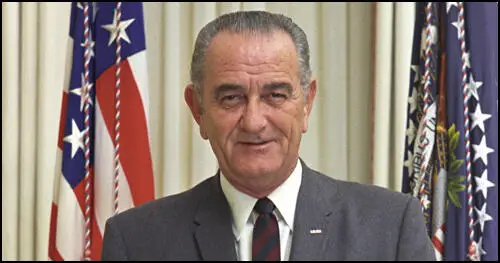On this day on 3rd November
On this day in 1534 Parliament passes the first Act of Supremacy, making King Henry VIII head of the Anglican Church, supplanting the pope and the Roman Catholic Church. In March 1534 Pope Clement VII announced that Henry's marriage to Anne Boleyn was invalid. Henry reacted by declaring that the Pope no longer had authority in England. In November 1534, Parliament passed the Act of Supremacy. This gave Henry the title of the "Supreme head of the Church of England". A Treason Act was also passed that made it an offence to attempt by any means, including writing and speaking, to accuse the King and his heirs of heresy or tyranny. All subjects were ordered to take an oath accepting this.
Sir Thomas More and John Fisher, Bishop of Rochester, refused to take the oath and were imprisoned in the Tower of London. More was summoned before Archbishop Thomas Cranmer and Thomas Cromwell at Lambeth Palace. More was happy to swear that the children of Anne Boleyn could succeed to the throne, but he could not declare on oath that all the previous Acts of Parliament had been valid. He could not deny the authority of the pope "without the jeoparding of my soul to perpetual damnation."
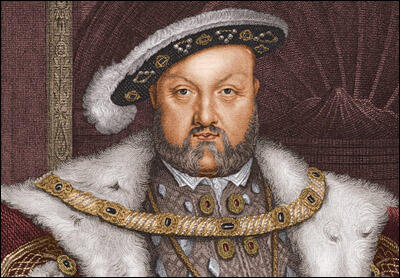
Henry VIII
On this day in 1579 John Stubbs had his right hand cut off. Stubbs was educated at Trinity College. He graduated from Cambridge University on 31st January 1561 and the following year he entered Lincoln Inn. During this period he developed strong Puritan views. According to Natalie Mears he felt particularly strongly on "the eradication of such practices as the wearing of surplices and kneeling at communion". Stubbs was called to the bar on 2nd February 1572.
Christopher Hatton, a member of the Privy Council and was involved in negotiations about the possible marriage of Queen Elizabeth to the Duke of Alençon. Hatton was against the match "but joined with the rest of the council in a sullen acquiescence, offering to support the match if it pleased her." However, there was a great deal of opposition to the proposed marriage. As Elizabeth Jenkins has pointed out: "The English dislike of foreign rule, which had shown itself strongly on the marriage of Mary Tudor, was now indissolubly connected with a fear of Catholic persecution. The idea of a French Catholic husband for the Queen roused the abhorrence which, in the Puritans, reached almost to frenzy."
John Stubbs was totally opposed to the marriage and wrote a pamphlet, The Discovery of a Gaping Gulf, criticizing the proposed marriage. It accused certain evil "flatters" and "politics" of espousing the interests of the French court "where Machiavelli is their new testament and atheism their religion". He described the proposed union as a "contrary coupling" and an "immoral union" like that of a cleanly ox with an uncleanly ass". Stubbs accused the Alençon family of suffering from sexually transmitted diseases and that Elizabeth should consult her doctors who would tell her she was exposing herself to a frightful death. Stubbs also argued that, at forty-six, Elizabeth may not have children or may be endangered in childbirth.
On 27th September 1579 a royal proclamation was issued prohibiting the circulation of the book. On 13th October Stubbs, Hugh Singleton (the printer), and William Page (who had been involved in the distribution of the pamphlet) were arrested. Elizabeth wanted to be immediately executed by royal prerogative but eventually agreed to their trial for felony. The jury refused to convict, and they were then charged with conspiring to excite sedition. The use of this statute was criticized by Judge Robert Monson. He was imprisoned and removed from the bench when he refused to retract.
Stubbs, Singleton and Page were all found guilty of sedition and were sentenced to have their right hands cut off and to be imprisoned, though it appears that Singleton was pardoned because of his age: he was about eighty. The sentence was carried out at the market place in Westminster on 3rd November 1579, with surgeons present to prevent them bleeding to death. Stubbs made a speech on the scaffold where he asserted his loyalty and asked the crowd to pray that God would give him strength to endure the punishment.
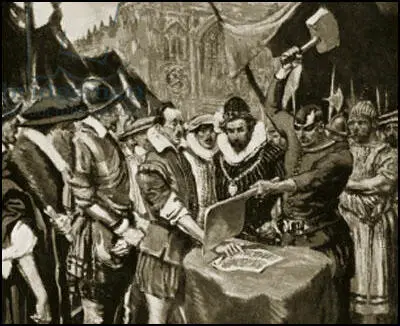
On this day in 1771 Francis Place, was born in a debtor's prison in Drury Lane, where his father worked as a overseer. After a short period at school, Francis was apprenticed to a leather-breeches maker. At nineteen he married and settled into a small house near the Strand in London.
In 1793 Place became involved in a strike. Place was identified as one of the leaders of the strikers and after the dispute was over he found it impossible to find work as a leather-breeches maker. While out of work Place read about the trial of Thomas Hardy, John Horne Tooke, and John Thelwall, the three leaders of the the London Corresponding Society.
Place became convinced that the most important thing that working men needed was the vote and despite the persecution of its membership, he decided to join the group. With their leaders in prison, Place was offered and accepted the post of Chairman. He held the post until 1797 when he resigned in protest against the violent tactics of some members of the organisation.
While out of work Place educated himself by reading books on history, law and economics. In 1799 he opened his own tailor's shop at 16 Charing Cross Road. He used part of his premises as a library of radical books. People came to his shop to read and borrow books and pamphlets by people like Tom Paine and Joseph Priestley. Place's library soon became a meeting-place for reformers.
In 1807 Francis Place helped Sir Francis Burdett in his campaign to represent the Westminster constituency in the House of Commons. The two men became close friends and over the next couple of years Burdett introduced Place to other radical figures such as Robert Owen, Jeremy Bentham, and Joseph Hume.
Place also met Joseph Lancaster who convinced him of the importance of providing children with a non-sectarian education. Place played an active role in promoting Lancastrian schools as he believed it provided the best opportunity of "promoting the happiness of the rising generation". Place also hoped that these schools would help to eradicate what he believed was harming the progress of the working class: "drunkeness, lax morals, bad manners and over population".
Although Place fathered fifteen children, he was deeply concerned about the growth in the British population. In 1822 he wrote and published The Principles of Population. People were shocked to read in the book that Place advocated the use of contraceptives. Place was labelled a "bold bad man" and even some Radicals shunned him after the publication of this book.
Place also gave help to Radical politicians in the House of Commons. He collected data on issues such as the Combination Acts and parliamentary reform and then passed it on to Sir Francis Burdett, John Hobhouse and Joseph Hume so they could promote the cause in Parliament. Between 1822 and 1824 Place collected eight volumes of statistics that he believed indicated that the Combination Acts should be repealed. Place argued that the repeal of the Combination Acts would lead to the disappearance of trade unions. Place achieved victory in 1824 but he was shocked when he discovered that one of the consequences of this was a rapid growth in the trade union movement.
After the repeal of the Combination Acts in 1824 Place turned his attention to parliamentary reform. He played a prominent in the agitation that resulted in the 1832 Reform Act. Upset by the limited scope of the reform he joined with John Cleave, Henry Hetherington, and William Lovett to form the London Working Men's Association in 1836. Two years later he helped draft the People's Charter that instigated the Chartist movement.
Place was a Moral Force Chartist and argued strongly against the use of violence to obtain the vote. When Feargus O'Connor replaced William Lovett as the unofficial leader of the movement, Place ceased to be involved in Chartist activities. After 1840 Francis Place concentrated his energies on organizing the campaign against the Corn Laws. He also spent a considerable amount of time writing his autobiography and a history of the 1832 Reform Act.
Francis Place died at the Hammersmith home of his two unmarried daughters on 1st January, 1854.
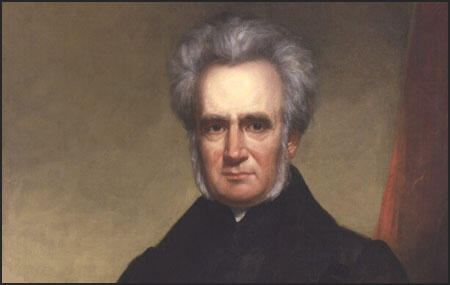
On this day 1846 artist Elizabeth Thompson was born in Lausanne. Her sister, Alice Thompson, was born the following year. Both Elizabeth's parents were interested in art and at an early age she was encouraged to paint and draw. At first Elizabeth concentrated on painting portraits and landscapes but after visiting France, where she saw paintings inspired by the Franco-Prussian War, she began to paint military subjects.
In 1874 submitted a painting entitled the Roll Call to the Royal Academy in London. The selection committee were impressed and decided to include it in the Academy's yearly exhibition. The painting caused a sensation. Crowds flocked to the Academy to see the painting. The Spectator reported: "There is an inconvenient crowd in the same corner of the room that hangs Miss Elizabeth Thompson's Calling the Roll. On Monday, when we were there it was almost impossible to see it." It was so popular that it was decided to take the painting on a tour around the country. Wherever it went, large queues formed to see the picture.
There was also great competition to buy the Roll Call but when Queen Victoria made it clear that she wanted it, the other bidders agreed to withdraw their bids. However, Victoria did agree that an engraving should be made of the picture. Prints were made from the engraving and this allowed thousands of people all over Britain to have their own copy of the Roll Call hanging on their wall.
The main reason why Elizabeth's painting created such a sensation was that she had taken a completely new approach to military paintings. Up until this time military paintings had shown "panoramic views of battles or scenes of gallant officers performing heroic deeds". However, Elizabeth had painted a picture of a group of British soldiers after they had taken part in a battle during the Crimean War. Unlike previous military painters, Butler was interested in recording the pain and suffering of ordinary soldiers.
Roll Call also caused a sensation because it was painted by a woman. In the nineteenth century there were few women artists. Those that did paint, did not paint military subjects. Elizabeth Thompson helped to change peoples' attitudes towards women artists. John Ruskin, Britain's leading art critic at the time wrote: "I have always said that no women could paint." After seeing Roll Call Ruskin admitted he had been wrong.
By 1875 Thompson was the most popular and well-known painter in Britain. For the next five years large sums of money were paid for her military paintings. Elizabeth always took great care to make sure details of her picture was correct. Soldiers who had taken part in the battle would visit her studio in Portsmouth. These men would pose for her wearing the uniforms and carrying the weapons that they had used during the battle.
In 1877, Elizabeth married Major William Butler. Her husband came from a poor Roman Catholic family from Ireland. William had strong opinions about the way the Catholics had been treated in Ireland. His views had an influence on Elizabeth. For example, while living in Ireland, Elizabeth Thompson heard of a Catholic woman who was about to be evicted from her home. Elizabeth hurried to the scene and arrived to find the women's cabin had been destroyed by the landlord. While the women searched the ruins for her belongings, Elizabeth set up her easel and began to paint the scene. For historical reasons the British public had little sympathy for the plight of the Catholics in Ireland. Elizabeth's painting Evicted was unpopular in Britain and failed to find a buyer.
The public were also beginning to turn against Elizabeth's military paintings. During the first Boer War (1880-81) people in Britain became very patriotic. They now wanted pictures that glorified British victories. Some people began to complain that Elizabeth's paintings undermined the morale of the British soldiers. Paintings that emphasised the pain and suffering of soldiers were unlikely to encourage men to join the British army. After 1881 Elizabeth found it very difficult to sell her paintings. Although Elizabeth Thompson continued to paint military pictures until her death on 2nd October 1933, she was never again to achieve the popularity that she enjoyed in the early part of her career.
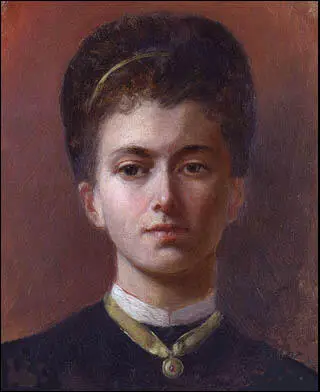
On this day in 1858 Harriet Taylor Mill, English philosopher died. At the age of eighteen she married John Taylor, a wealthy businessman from Islington. In the next few years Harriet had two sons and one daughter, Helen Taylor. John and Harriet both became active in the Unitarian Church and developed radical views on politics. They became friendly with William Johnson Fox, a leading Unitarian minister and early supporter of women's rights.
Harriet Taylor moved in radical circles and in 1830 she met the philosopher John Stuart Mill. Taylor was attracted to Mill, the first man she had met who treated her as an intellectual equal. Mill was impressed with Taylor and asked her to read and comment on the latest book he was working on. Over the next few years they exchanged essays on issues such as marriage and women's rights. Those essays that have survived reveal that Taylor held more radical views than Mill on these subjects. She argued: "Public offices being open to them alike, all occupations would be divided between the sexes in their natural arrangements. Fathers would provide for their daughters in the same manner as their sons."
Taylor was attracted to the socialist philosophy that had been promoted by Robert Owen in books such as The Formation of Character (1813) and A New View of Society (1814). In her essays Taylor was especially critical of the degrading effect of women's economic dependence on men. Taylor thought this situation could only be changed by the radical reform of all marriage laws. Although Mill shared Taylor's belief in equal rights, he favoured laws that gave women equality rather than independence.
In 1833 Harriet negotiated a trial separation from her husband. She then spent six weeks with Mill in Paris. On their return Harriet moved to a house at Walton-on-Thames where John Start Mill visited her at weekends. Although Harriet Taylor and Mill claimed they were not having a sexual relationship, their behaviour scandalized their friends. As a result, the couple became socially isolated.
John Roebuck later argued: "My affection for Mill was so warm and so sincere that I was hurt by anything which brought ridicule upon him. I saw, or thought I saw, how mischievous might be this affair, and as we had become in all things like brothers, I determined, most unwisely, to speak to him on the subject. With this resolution I went to the India House next day, and then frankly told him what I thought might result from his connection with Mrs. Taylor. He received my warnings coldly, and after some time I took my leave, little thinking what effect my remonstrances had produced. The next day I again called at the India House. The moment I entered the room I saw that, as far he was concerned, our friendship was at an end. His manner was not merely cold, but repulsive; and I, seeing how matters were, left him. His part of our friendship was rooted out, nay, destroyed, but mine was untouched."
Except for a few articles in the Unitarian journal Monthly Repository, Taylor published little of her own work during her lifetime. However, Taylor read and commented on all the material produced by John Stuart Mill. In his autobiography, Mill claimed that Harriet was the joint author of most of the books and articles that were published under his name. He added, "when two persons have their thoughts and speculations completely in common it is of little consequence in respect of the question of originality, which of them holds the pen."
In 1848 John Stuart Mill's Principles of Political Economy was published. Mill planned to include details of the role that Taylor had played in the production of the book, but when John Taylor heard about this he objected and references to his wife were removed. However, in his autobiography, Mill pointed out that the book was "a joint production with my wife".
John Taylor died of cancer on 3rd May, 1849. Still concerned about gossip and scandal, Harriet insisted that they wait two years before they got married. A few months after the wedding the Westminster Review published The Enfranchisement of Women. Although the article had been mainly written by Taylor, it appeared under John Stuart Mill's name. The same happened with the publication of an article in the Morning Chronicle (28th August, 1851) where they advocated new laws to protect women from violent husbands. A letter written by Mill in 1854 suggests that Harriet was reluctant to be described as joint author of Mill's books and articles. "I shall never be satisfied unless you allow our best book, the book which is to come, to have our two names on the title page. It ought to be so with everything I publish, for the better half of it all is yours".
John Stuart Mill had always favoured the secret ballot but Harriet disagreed and eventually changed her husband's views on the subject. Taylor feared that people would vote in their own self-interest rather than for the good of the community. She believed that if people voted in public, the exposure of their selfishness would shame them in voting for the candidate who put forward policies that were in the interests of the majority.
Harriet Taylor and John Stuart Mill both suffered from tuberculosis. While in Avignon, seeking treatment for this condition in November, 1858, Harriet died. Mill and Taylor had been working on a book The Subjection of Women at the time. Helen Taylor, Harriet's daughter, now helped Mill to finish the book. The two worked closely together for the next fifteen years. In his autobiography Mill wrote that "Whoever, either now or hereafter, may think of me and my work I have done, must never forget that it is the product not of one intellect and conscience but of three, the least considerable of whom, and above all the least original, is the one whose name is attached to it."
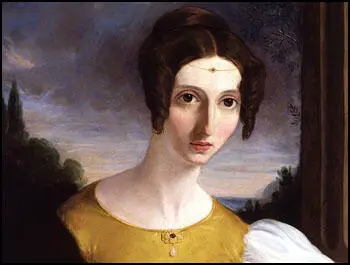
On this day in 1904 Jennie Lee, the daughter of James Lee a miner, was born in Lochgelly, Fife.
When Jennie was three years old James and Euphemia were persuaded to take over the management of a hotel and theatre in Cowdenbeath, that had formerly being run by Jennie's grandmother. Trade was affected by the fact that it was a Temperance Hotel and did not sell alcohol.
In 1912 James Lee decided to give up the hotel and once again became a miner. Jennie became a regular visitor to Mr. Garvie's Bookshop in Cowdenbeath. Garvie was blind and used to read to him from his favourite book, A History of the Working Classes. Another family friend, Jim Beveridge, lent Jennie a copy of the Ragged Trousered Philanthropist by Robert Tressell. Jennie Lee was also very fond of the Happy Prince by Oscar Wilde.
James Lee was chairman of the local branch of the Independent Labour Party. Jennie accompanied her father to these meetings and heard several leading socialists including James Maxton and David Kirkwood. Lee like most members of the ILP was opposed to Britain's involvement in the First World War. In the newspapers she read about Aneurin Bevan, a nineteen year old miner from South Wales, who refused to take part in the war. Bevan, who was later to marry Jennie Lee, told the local magistrates: "I am not and never have been a conscientious objector. I will fight, but I will choose my own enemy and my own battlefield and I won't have you do it for me."
As a fourteen year old schoolgirl, Jennie remembered the excitement of her father and friends when they heard news of the Russian Revolution. After the war James Lee was one of the leaders of the Hands off Russia movement that attempted to counterbalance the campaign led by Winston Churchill to invade Russia.
Jennie wanted to go to university but her parents were unable to afford the fees. However, with support from the Carnegie Trust, who agreed to pay half her fees and the Fife Education Authority, who awarded her a grant of £45 a year, she was able to become a student at Edinburgh University.
At university Jennie joined the Labour Club, the University Women's Union and the editorial board of the Rebel Student. One of Jennie's first campaigns was to have Bertrand Russell elected as Rector of the university. Russell a pacifist and campaigner for women's rights was a popular figure with university students at that time. During the First World War Russell was sacked from his post as a lecturer at Cambridge University and imprisoned for his involvement with the No-Conscription Fellowship (NCF), an organisation that encouraged men to refuse war service.
Jennie was a great reader and favourite authors at university included H. N. Brailsford, Bertrand Russell, H. G. Wells and Olive Schreiner. It was while at university in Edinburgh that Jennie gained her first experience of public speaking. Jennie could often be found on the Mound in Princess Street making speeches on Socialism and votes for women on the same terms as men. Jennie also attended weekend schools organised by the National Council of Labour Colleges where she met Ellen Wilkinson for the first time.
During the General Strike Jennie returned home to give support to the miners. She had just won a MacLaren Bursary, which she was able to hand over to her family struggling on her father's strike pay. When the strike was over James Lee, like many union activists, was sacked, blacklisted and after four months unemployment was forced to take work as a manual labourer.
Jennie's political work did not interfere with her studies and she left University of Edinburgh with a degree in education and law. She taught at her school in Cowdenbeath but after an impressive speech at the 1927 National Conference of the Independent Labour Party, Jennie was invited to become the ILP candidate for North Lanarkshire.
Jennie Lee was elected to Parliament at a by-election in February 1929 when she turned a 2,028 Conservative majority into a Labour majority of 6,578. At twenty-four she was the youngest member of the House of Commons. The Labour leadership selected Margaret Bondfield and the Chief Whip, Tom Kennedy, to introduce Jennie into Parliament. Jennie rejected the idea and insisted that two old friends from Scotland, Robert Smillie and James Maxton, should be her sponsors. This was the first of many conflicts that she was to have with the leadership of the party over the next few years.
Jennie's first speech in the House of Commons was a fierce attack on Winston Churchill and his budget proposals. Afterwards she congratulated Jennie on her speech and told her that he also wanted to help the poor but she had to understand that: "The richer the rich became, the more able they would be to help the poor".
In the House of Commons Jennie's closest friend was Frank Wise, one of the leaders of the Independent Labour Party. Wise was married and although he considered the possibility of divorce, they eventually decided against it. As she pointed out in a letter to Wise: "I feel that divorce and marriage would do both of us immense harm. Certainly public non-Catholic opinion is becoming more tolerant about divorce, but in triangles where all three parties are fairly equal as to age and other matters. The situation where a man has lived with one woman for twenty years, and becomes attached to another woman about twenty years younger, is too many unpleasant types, to be lightly accepted."
Another close friend was Aneurin Bevan, who represented Ebbw Vale in South Wales. Jennie was particularly impressed with Bevan's attack on David Lloyd George. The two young MPs had much in common. They both had fathers who were miners who had suffered terrible industrial defeats in 1919, 1921 and 1926. As she wrote later: "We were both now pinning our hopes on political action. We were eager to test to the full the possibility of bringing about basic socialist change by peaceful, constitutional means.
Jennie was totally opposed to Ramsay MacDonald and the National Government he formed in 1931. Like most Labour MPs who refused to support MacDonald, Jennie was defeated in the 1931 General Election. Over the next couple of years Jennie spent her time writing articles for the ILP New Leader and on lecture tours of the United States and Canada.
In 1931 G.D.H. Cole created the Society for Socialist Inquiry and Propaganda (SSIP). This was later renamed the Socialist League. Other members included William Mellor, Charles Trevelyan, Stafford Cripps, H. N. Brailsford, D. N. Pritt, R. H. Tawney, Frank Wise, David Kirkwood, Clement Attlee, Neil Maclean, Frederick Pethick-Lawrence, Alfred Salter, Gilbert Mitchison, Harold Laski, Frank Horrabin, Ellen Wilkinson, Aneurin Bevan, Ernest Bevin, Arthur Pugh, Michael Foot and Barbara Betts. Margaret Cole admitted that they got some of the members from the Guild Socialism movement: "Douglas and I recruited personally its first list drawing upon comrades from all stages of our political lives." The first pamphlet published by the SSIP was The Crisis (1931) was written by Cole and Bevin.
According to Ben Pimlott, the author of Labour and the Left (1977): "The Socialist League... set up branches, undertook to promote and carry out research, propaganda and discussion, issue pamphlets, reports and books, and organise conferences, meetings, lectures and schools. To this extent it was strongly in the Fabian tradition, and it worked in close conjunction with Cole's other group, the New Fabian Research Bureau." The main objective was to persuade a future Labour government to implement socialist policies.
In November 1933, Frank Wise collapsed and died. The following year she married Aneurin Bevan. Jennie Lee was defeated again at North Lanark in the 1935 General Election. Jennie remained involved in politics, and was especially active in trying to persuade the British Labour movement to create a Popular Front with other European groups in an attempt to stop the spread of fascism in the 1930s.
In 1940 Lord Beaverbrook, Minister of Aircraft Production, employed Jennie Lee in his department. She later left to work as a journalist for the Daily Mirror. In the 1945 General Election, she won the mining constituency of Cannock in Staffordshire. In the government formed by Clement Attlee, Jennie's husband, Aneurin Bevan, was made Minister of Health and was responsible for the introduction of the National Health Service.
Jennie Lee agreed with Aneurin Bevan about most political issues, but was unhappy with his decision to reject unilateral nuclear disarmament at the 1957 Labour Party Conference. However, she was aware that his decision was based on what he thought was best for the Labour movement and was deeply shocked with the way he was treated by fellow socialists during and after his speech. For as he had told her, "I can just about save this Party, but I shall destroy myself in doing so."
After the 1964 General Election Lee was appointed arts minister and was responsible for what Harold Wilson later called the greatest achievement of his Labour Government, the setting up of the Open University. She retired from the House of Commons in 1970 when she was created Baroness Lee of Asheridge.
Jennie Lee died on 16th November 1988.
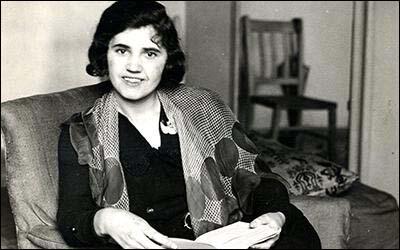
On this day in 1918 the German Revolution of 1918 begins when sailors take over the port in Kiel. By the evening Kiel was firmly in the hands of about 40,000 rebellious sailors, soldiers and workers. "News of the events in Keil soon travelled to other nearby ports. In the next 48 hours there were demonstrations and general strikes in Cuxhaven and Wilhelmshaven. Workers' and sailors' councils were elected and held effective power."
By the 8th November, workers councils took power in virtually every major town and city in Germany. This included Bremen, Cologne, Munich, Rostock, Leipzig, Dresden, Frankfurt, Stuttgart and Nuremberg. Theodor Wolff, writing in the Berliner Tageblatt: "News is coming in from all over the country of the progress of the revolution. All the people who made such a show of their loyalty to the Kaiser are lying low. Not one is moving a finger in defence of the monarchy. Everywhere soldiers are quitting the barracks."
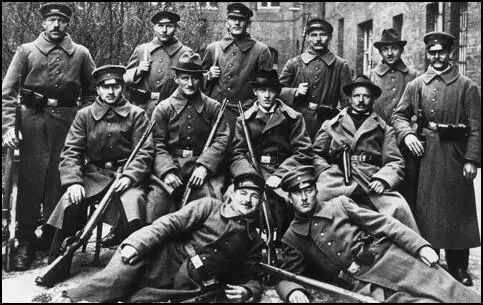
On this day in 1918, Elizabeth Paschel Hoisington, a United States Army officer who was one of the first two women to attain the rank of brigadier general, was born.
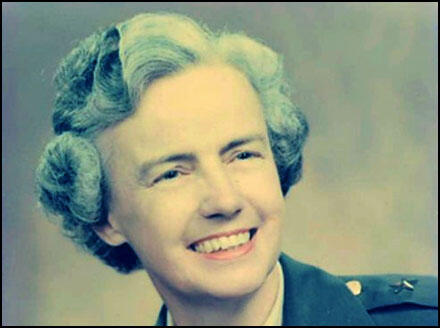
On this day in 1926 Annie Oakley died. She was born in Darke County, Ohio, on 13th August, 1860. When she was a child her father died. According to Kirstin Olsen his death left "behind a hungry family and a mortgaged farm". Olsen adds: "Oakley, legend has it, remedied both ills by shooting game. Her family ate what it could and paid off the mortgage by selling the rest." leaving behind a hungry family and a mortgaged farm.
In 1880 she defeated Frank Butler, a sideshow marksman, in Cincinnati. After marrying Butler she joined the Sells Brothers Circus where she developed a national reputation for carrying out amazing shooting feats. This included shooting the ashes off a cigarette in the mouth of her husband. Another trick included shooting through the pips of a playing card tossed in the air.
In 1885 she joined the famous Buffalo Bill Wild West Show. Less than five feet tall, she was billed as "Little Sure Shot", and was the organization's leading star for the next 17 years. Using a hand-mirror she could fire over her shoulder and hit a small target. Oakley was also just as accurate as a markswoman while riding on the back of a running horse. The historian Dan L. Thrapp has argued: "Some of her shooting feats were phenomenal; she was an especial success in Europe, performing before Royalty." This included Queen Victoria and she once shot a cigarette from the mouth of a German prince who later became Kaiser Wilhelm II.
In 1901 Oakley was badly injured in a railway crash. It left her temporarily paralyzed and she was forced to leave the Buffalo Bill Wild West Show. She recovered and eventually resumed her career. During the First World War she gave demonstrations of her shooting skills to soldiers in the US Army. She also sent a letter to the Kaiser Wilhelm II, requesting a second shot.
Annie Oakley died in Greenville, Ohio, on 3rd November, 1926. Her husband died three weeks later and was buried beside Annie in the Brock Cemetery in Darke County.
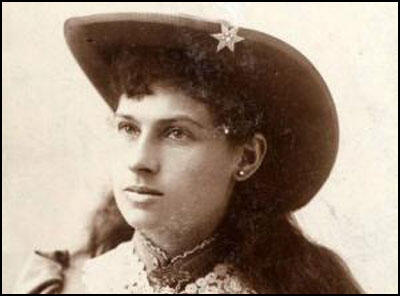
On this day in 1936 Franklin D. Roosevelt is re-elected President of the United States. When Roosevelt took office in 1933 the national deficit was nearly $3,000,000,000 and the unemployment-rate was 23.6%. His Treasury Secretary Henry Morgenthau, and aides within the Treasury Department favored an approach that sought to balance the federal budget. But other advisers in the President's inner circle, including Harry Hopkins, Marriner Eccles and Henry Wallace, had accepted the recent theories of John Maynard Keynes, who argued that technically advanced economies would need permanent budget deficits or other measures (such as redistribution of income away from the wealthy) to stimulate consumption of goods and to maintain full employment. It was argued that it was the attempt to balance the budget that was causing the recession.
President Roosevelt was eventually convinced by these arguments and he recognized the need for increased government expenditures to put people back to work. An important part of his New Deal programme was increased spending on government expenditures for relief and work schemes. From 1933 to 1937, unemployment was reduced from 25% to 14%.
Roosevelt was much attacked by his political opponents for not concentrating on reducing the national deficit. However, as Roosevelt explained in a speech in 1936: "To balance our budget in 1933 or 1934 or 1935 would have been a crime against the American people. To do so we should either have had to make a capital levy that would have been confiscatory, or we should have had to set our face against human suffering with callous indifference. When Americans suffered, we refused to pass by on the other side. Humanity came first."
During the 1936 Presidential Election, Roosevelt was attacked for not keeping his promise to balance the budget. The National Labour Relations Act was unpopular with businessmen who felt that it favoured the trade unions. Some went as far as accusing Roosevelt of being a communist. However, the New Deal was extremely popular with the electorate and Roosevelt easily defeated the Republican Party candidate, Alfred M. Landon, by 27,751,612 votes to 16,681,913.
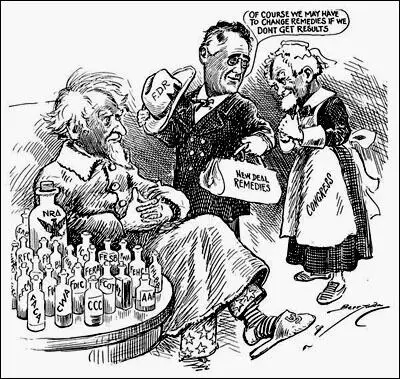
On this day in 1953, Vilma Santos, a Filipino actress and politician, was born. She served as governor of Batangas for three consecutive terms and as mayor of Lipa for also three consecutive terms.
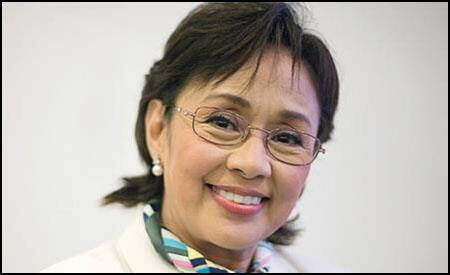
On this day in 1957 Wilhelm Reich, psychotherapist, died. In 1923 the Social Democratic Party government in Vienna, inspired by the ideas of Victor Adler and the leadership of Jakob Reumann, began a massive home building programme by constructing 2,256 new residential homes for working-class families. The government instituted social, healthcare and educational reforms. These measures helped to raise their standard of living. This deepened the ties of workers towards the party and created a large pool of loyalists on whom the party could always depend. Otto Bauer, one of the people behind the project, claimed they were "creating a revolution of souls".
Sigmund Freud decided to give his support to this venture. He urged his followers to create "institutions or out-patients... where treatment shall be free". He hoped that one day these clinics would be state-funded: "The neuroses threaten public health no less than tuberculosis." The Vienna Psychoanalytic Society established the Ambulatorium, a free psychoanalytic clinic in Vienna. Those who worked at the clinic included Wilhelm Reich, Annie Reich, Eduard Hitschmann, Helene Deutsch, Siegfried Bernfeld, August Aichhorn, Wilhelm Hoffer and Grete Bibring.
Wilhelm Reich became deputy director of the Vienna Ambulatorium. In the next few years 1,445 men and women were treated in the Ambulatorium. The vast majority were working-class, with over 20% being unemployed. Reich claimed: "The consultation hours were jammed. There were industrial workers, office clerks, students, and farmers from the country. The influx was so great that we were at a loss to deal with it."
Reich began associating with left-leaning therapists such as Karen Horney, Ernst Simmel, Erich Fromm, Viktor Frankl, Edith Jacobson, Helene Deutsch, Frieda Reichmann, Edith Weigert and Otto Fenichel who began to take into consideration the social and political impact on the clinical situation. Together they explored ways of "finding a bridge between Marx and Freud". Elizabeth Ann Danto, described the group as being interested in providing "a challenge to conventional political codes, a social mission more than a medical discipline."
Eduard Hitschmann (director) is in the centre. On his left is Wilhelm Reich,
Grete Bibring, Richard Sterba and Annie Reich.
On this day in 1964 Lyndon B. Johnson was elected as U.S. president, winning 61% of the vote. A few months earlier Congress passed the Civil Rights Act. After a delay of over 100 years this act created federal law in support of the original purpose of the 14th Amendment, equal treatment under the laws for blacks and whites. This act outlawed racial discrimination in employment, voting, education and public accommodation. Johnson also encouraged the passing of the Anti-Poverty Act (1964) that provided $947.5 million dollars for job training centres, loans to poor students and low-income farmers, and basic education programs. When Johnson signed the 1965 Civil Rights Act he made a prophecy that he was “signing away the south for 50 years”. This proved accurate. In fact, the Democrats have never recovered the vote of the white racists in the Deep South.
